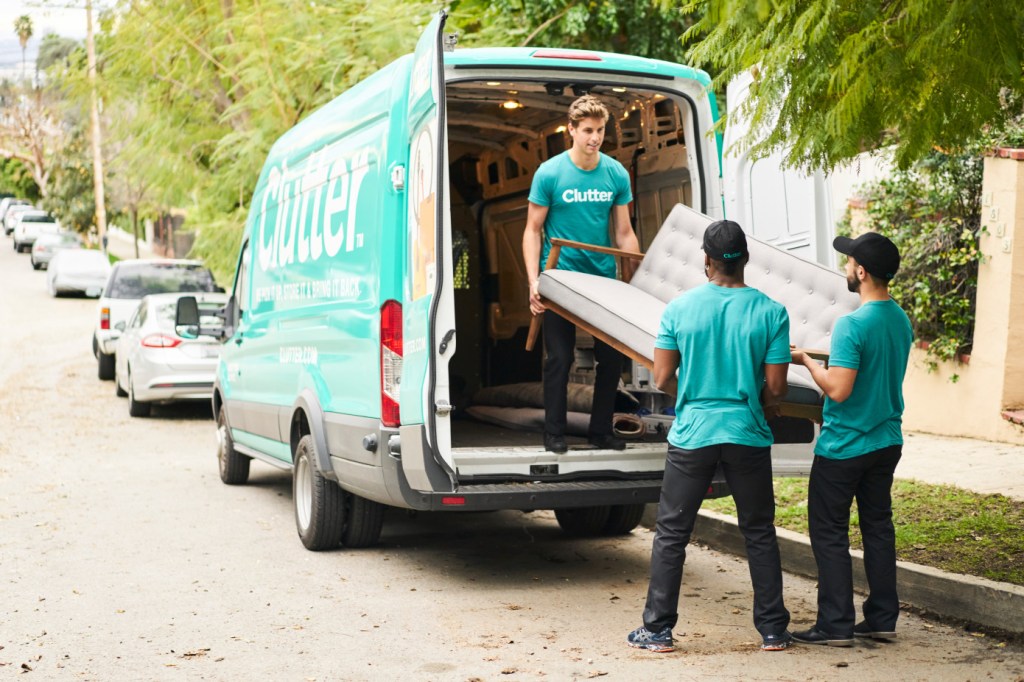Some consolidation is afoot in the world of moving and storage startups: Clutter and MakeSpace, two erstwhile rivals in the market, are merging to form a single company, which will operate under the Clutter brand, serving some 6,500 towns in the U.S. that together cover about 60% of the total population in the country, with operations also in Canada, covering services like on-demand moving, storage, self-storage and disposal.
Financial terms of the deal are not being disclosed, Clutter founder and CEO Ari Mir told me in an interview, except to confirm that it is an all-equity deal in which MakeSpace’s shareholders will become shareholders in Clutter (and this is probably also why it’s a “merger” and not an acquisition: no one is exiting or cashing out in the deal). He also said that the company combined will be clearing close to $200 million in revenue annually, that it will break even this year and that it’s planning for an IPO in 2023. Mir will continue with his role and will also be CEO of the merged business, while MakeSpace’s CEO Rahul Gandhi will become president.
The enlarged Clutter does not have any plans to raise any more funding before then, Mir said. It’s unclear how many employees will be at the combined company. Clutter has around 1,000 employees and Mir said they made offers to some but not all MakeSpace employees to join the merged firm. Both companies operated on a model of employing all of their delivery drivers, rather than employing gig workers.
“It was a natural culture fit for us,” Mir said.
I have confirmed that Clutter was valued at around $580 million when it last raised money, back in 2019, a $200 million round led by SoftBank. MakeSpace last raised in 2021, a $55 million round when the pandemic was well under way, with its investors including strategic backer IronSource and a number of others. MakeSpace did not disclose its valuation at that time, but it looks like it had been a wobbly ride based on PitchBook data. Both companies have grown since then.
Mir said that the deal caps off a long-held ambition of his to make Clutter a consolidator in the space and he’d been eyeing up MakeSpace for a while now.
“I’ve always been a big fan of building relationships and have been working on the relationship with MakeSpace for years now,” he said in an interview. He said he’d periodically reached out “once or twice a year” before the latter company finally bit. Indeed, I heard about this deal going down several months ago, although both companies declined to comment on the situation at the time.
One of these is the effects of the pandemic.
COVID-19 has been a period of social distancing and staying put, but not for everyone: a lot of us took the moment to pause, think about how and where we are living and, in many cases, take action by relocating, downsizing or simply rethinking our living spaces. All of that has had a big impact on companies like Clutter and MakeSpace, both of which saw business continue to grow in the last two years. Clutter, Mir told me, was designated an essential service and continued all operations as normal, while MakeSpace’s Gandhi told me last year that it was outpacing its growth forecasts for the period by 30%.
The other is economy of scale.
As with any logistics-based business — the wider category of e-commerce being one prime other example — ultimately the most successful players are those that have grown to a big enough size that they are maximizing their network of operations with as many customers and orders as possible for the best margins on that model.
That is very much the case here, too. Clutter, Mir told me, was profitable in its bigger markets but not everywhere; this merger will give it, and MakeSpace, the ability to aim for positive unit economics and better margins in more places. And, it will also cut out one more competitor in places where they overlapped, meaning less money to spend on marketing and promotions.
This is not Clutter’s first acquisition and consolidation move. It acquired The Storage Fox in 2019 for $152 million also as part of that strategy. It also bought assets from failed storage startup Omni in the same year, and has picked up assets from Handy, Livible, Shed and Callbox. MakeSpace has also been doing some consolidating, acquiring Stashable from Iron Mountain when it raised its Series D led by the business storage giant.
“The moving and storage industries are fragmented, and a really frustrating experience for a lot of customers. There is clear demand for a brand that consumers know they can trust nationwide, and the combination of MakeSpace and Clutter will put the company in an excellent position to offer convenient storage and moving services nationwide, with plenty of room to grow,” said Gandhi in a statement.































Comment